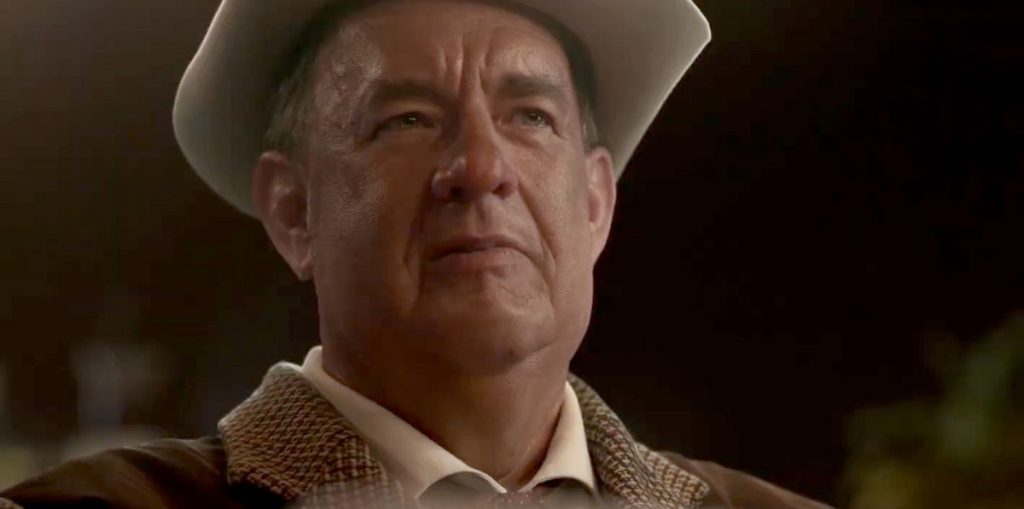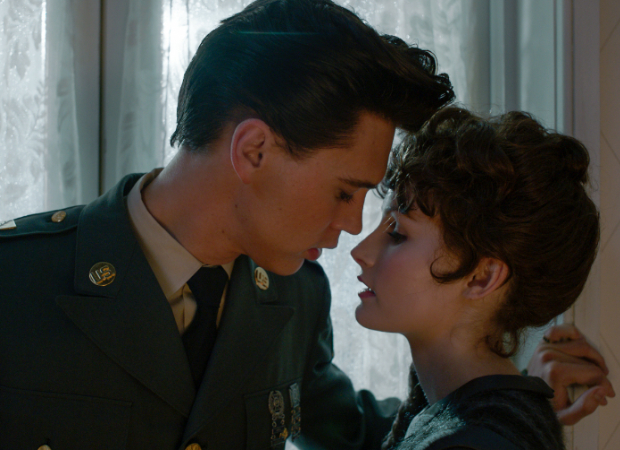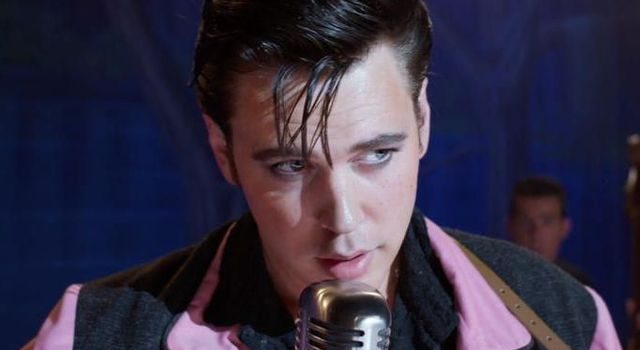By Lynn Venhaus
Baz Luhrmann’s sensational and stylish spin on the man, the myth and the legend, “Elvis” restores the luster to the once fallen King of Rock ‘n Roll.
For those who may wonder why Elvis Aaron Presley is a cultural icon, this lovingly crafted film is the definitive exhibit A. There will be no doubt about how he became the rebel yell of a generation and shook up society’s norms in prim 1950s Eisenhower America. His raw, incandescent talent made such an impact as to forever change popular music.
Through Luhrmann’s trademark kinetic, frenetic method, he depicts a young Elvis (Chaydon Jay) as a church-going mama’s boy who grew up in poverty and how early black music influences shaped him into a soulful white singer.
That unique mix of rockabilly, country, Southern gospel, blues, and pop ballads that made Elvis stand out – and breakthrough racial barriers – is an aural delight, thanks to the massive teams of sound engineers and music technicians.
In a breathtaking and brilliant performance, Austin Butler scorches the screen as Elvis from teen heartthrob to red-hot superstar to Vegas comeback to drug-addled shell of his former self.
By bringing out Elvis’ humanity and how his identity was shaped, Butler puts an indelible stamp on one of the 20th century’s brightest supernovas. Dynamic in song, movement, and demeanor, the actor is mesmerizing in a classic “star is born” scenario.
Previously, he was Tex Watson, one of the Manson family, in Quentin Tarantino’s “Once Upon a Time in Hollywood” and as a youth, cast in Disney-Nickelodeon television shows. It’s one of those magnetic star turns where everyone will now know who he is.
Welcome to the evolution. Luhrmann chronicles Elvis’ meteoric rise in vibrant vignettes as the singer’s sinewy sensuality electrified audiences. Oh, the scandals, the puritanical shock, and the excitement rippling through white middle-class America.
There isn’t much room for character development in the sprawling supporting cast, but the performers make the most of their brief screen time. Kelvin Harrison Jr. is memorable as a young B.B. King, hanging out with his white friend on Beale Street, while Kodi Smit-McPhee is under-used as singer Jimmie Rodgers, who helped introduce Elvis to the uninitiated.
Of significance is Sam Phillips (Josh McConville) of Sun Records, his smart receptionist Marion Keisker (Kate Mulvany) and DJ Dewey Phillips (Patrick Shearer), for without this power trio, there’d be no velvet Elvis.
Other music influences mentioned are David Wenham as country singer Hank Snow, Alton Mason as Little Richard, Gary Clark Jr. as Arthur “Big Boy” Crudup and Yola as Sister Rosetta Tharp.
The technical work dazzles, with cinematographer Mandy Walker giving each decade a particular retro look. Editors Matthew Villa and Jonathan Redmond, who previously worked together on Luhrmann’s 2013 “The Great Gatsby,” wove news clippings, music, videos, period details and classic recreations for the ultimate sizzle reel.
Luhrmann’s wife and frequent collaborator, Catherine Martin, did outstanding work as both the costume designer and production designer, spotlighting the signature looks, humble beginnings and lavish lifestyle..

Luhrmann shows how Elvis, nicknamed “The Memphis Flash,” created a danger zone all by his lonesome. And how the naïve working-class ‘hillbilly’ and his unsophisticated parents Gladys (Helen Thomson) and Vernon (Richard Roxburgh) were taken advantage of by cagey con artist Colonel Tom Parker, who recognized a meal ticket and corralled the innocent young kid so he could pull the strings.
Part fraud, part genius promoter, Parker’s greed, power moves and deceptive practices are brought into sharper focus here, and for this sleazier damning portrait, a nearly unrecognizable Tom Hanks adopts a distinctive voice and dramatically changes his physical appearance. It’s rare to see Hanks as a villain, and takes some getting used to, as does the unusual vocal cadence.
As mastermind of the illusion, Parker is both credited and cursed in the screenplay co-written by Luhrmann, his longtime collaborator Craig Pearce (“Moulin Rouge,” “Romeo +Juliet” and “Strictly Ballroom”), Sam Bromell and Jeremy Doner, with story by Luhrmann and Doner.
Luhrmann’s hyper-visual flourishes eventually find its rhythm and yields to a more conventional narrative. Now in the Army in 1958 to cool down his controversial gyrations– those swiveling hips on national television! His ‘rubber legs’! – his fateful romance with Priscilla Beaulieu is sweetly told.

Australian actress Olivia DeJonge, recently seen in the HBO limited series “The Staircase,” is a stable influence as the love of Elvis’ life. She was 14, he was 24 when they met while he was stationed in Germany. After a seven-year courtship, they were married in 1967 and divorced in 1973. Butler and DeJonge make the coupling work as the calm eye in the hurricane.
The movie really takes flight when it tackles how the social upheaval of the 1960s affected art and became a catalyst for pop stars wanting to be relevant. Elvis was on the verge of has-been territory as his popularity waned after a string of movie flops. His entourage, aka The Memphis Mafia, had grown unwieldy. But his trusted asset, talent manager Jerry Schilling (Luke Bracey), is an integral part of the trailblazing.
You can describe Elvis in many ways, but bland isn’t part of the vocabulary. The entertainer knew he needed a makeover, and he shrewdly enlisted record producer Bones Howe (Gareth Davies) and director Steve Binder (Dacre Montgomery) to recharge his image so he mattered again.
This is best demonstrated by the fascinating behind-the-scenes sequence of the “Singer Presents Elvis” TV special set for airing on Dec. 3, 1968. Can you imagine The King wearing a Christmas sweater and singing carols? That’s what the sponsor and Parker thought they were recording, but the hip cool people in charge pulled off a minor miracle – a thrilling combination of Elvis unplugged and off-the-charts charisma that cemented his live solo stature. Now known as the “Comeback” special, it was the highest rated show for NBC that year, and often imitated thereafter.
His back-on-top transformation reignited a fire within, and Elvis returned to live performances, establishing residency in Vegas.
But Elvis’ downward spiral in the 1970s can’t be avoided, and neither can what eventually led to his untimely death at age 42 on Aug. 16, 1977.
While Elvis’ remarkable life is more material that can be contained in one feature, this film delivers the key moments for a sympathetic, complex, yet tragic, portrait. With a singular vision, Luhrmann hits the sweet spot as he achieves a new appreciation for rock ‘n roll royalty. And that’s all right.

“Elvis” is a 2022 biographical drama directed by Baz Luhrmann and starring Austin Butler, Tom Hanks, Olivia DeJonge and Kelvin Harrison Jr. It runs for 2 hours, 39 minutes, and is rated PG-13 for substance abuse, strong language, suggestive material and smoking. It is in theatres on June 24. Lynn’s Grade: A

Lynn (Zipfel) Venhaus has had a continuous byline in St. Louis metro region publications since 1978. She writes features and news for Belleville News-Democrat and contributes to St. Louis magazine and other publications.
She is a Rotten Tomatoes-approved film critic, currently reviews films for Webster-Kirkwood Times and KTRS Radio, covers entertainment for PopLifeSTL.com and co-hosts podcast PopLifeSTL.com…Presents.
She is a member of Critics Choice Association, where she serves on the women’s and marketing committees; Alliance of Women Film Journalists; and on the board of the St. Louis Film Critics Association. She is a founding and board member of the St. Louis Theater Circle.
She is retired from teaching journalism/media as an adjunct college instructor.



